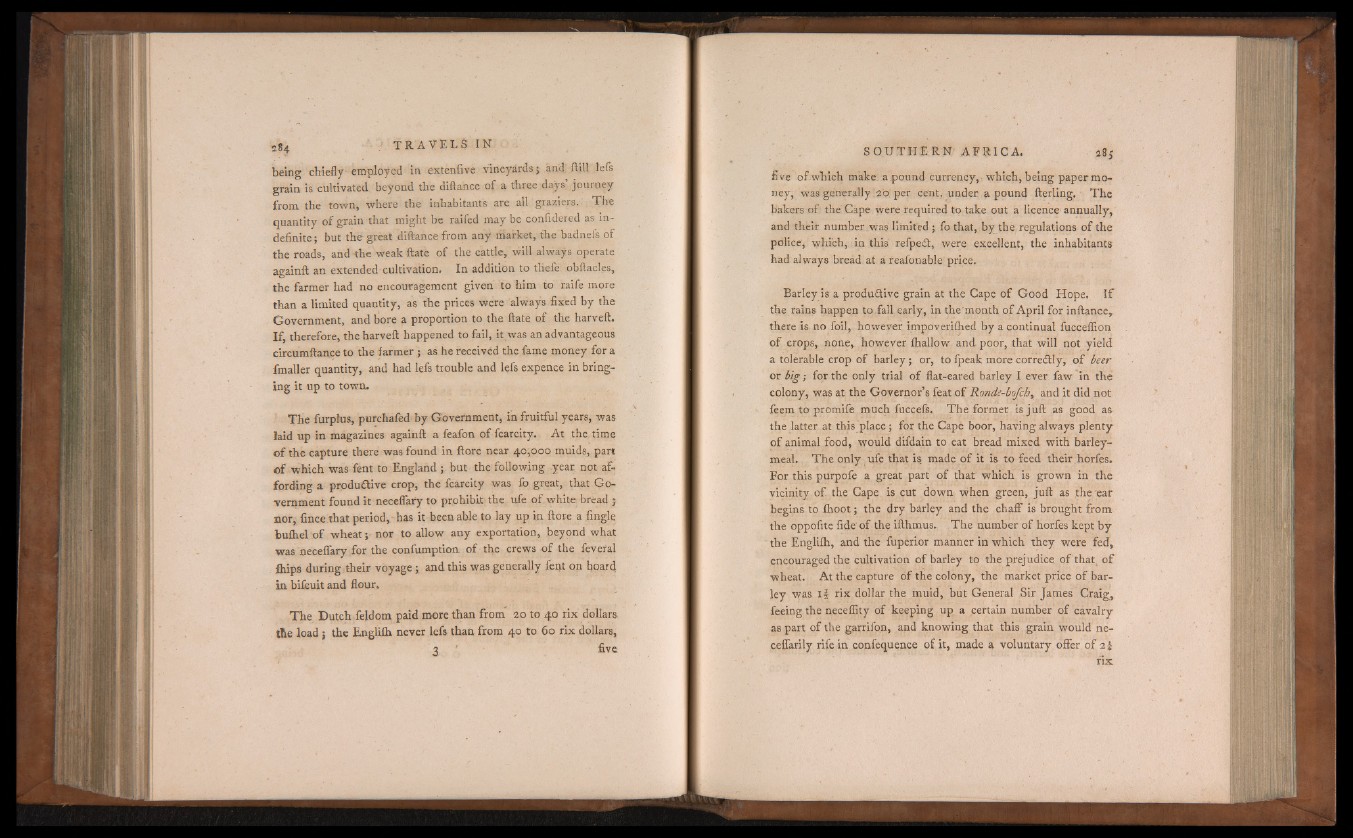
being chiefly employed in extenfive vineyards: and ftill lefs
grain is cultivated beyond the diftance of a three days journey
from the town, where the inhabitants are all graziers. The
quantity of grain that might be raifed may be confidered as indefinite
; but the great diftance from any market, the badnefs of
the roads, and the weak ftate of the cattle, will always operate
againft an extended cultivation. In addition to thefe obftacles,
the farmer had no encouragement given to him to raife more
than a limited quantity, as the prices were always fixed by the
Government, and bore a proportion to the ftate of the harveft.
If, therefore, the harveft happened to fail, it was an advantageous
circumftance to the farmer ; as he received the fame money for a
fmaller quantity, and had lefs trouble and lefs expence in bringing
it up to town.
The furplus, purchafed by Government, in fruitful years, was
laid up in magazines againft a feafon of fcarcity. At the time
of the capture there was found in ftore near 40,000 muids, part
of which was fent to England ; but the following year not affording
a produftive crop, the fcarcity was lb great, that Government
found it neceflary to prohibit the ufe of white bread 5
nor, fince that period, has it been able to lay up in ftore a fingle
bulhel of wheat; nor to allow any exportation, beyond what
was neceflary for the confumption of the crews o f the feveral
ihips during their voyageand this was generally fent on hoard
in bifeuit and flour.
The Dutch feldom paid more than from ao to 40 rix dollars
the load j the Englilh never lefs than from 40 to 60 rix dollars,
3 ' five
five of.which make a pound currency, which, being paper money,
was generally 20 per cent, under a pound fterling. The
bakers of the Cape were required to take out a licence annually,
and their number was limited ; fo that, by the regulations of the
police, which, in this refpebt, were excellent, the inhabitants
had always bread at a reafonable price.
Barley is a productive grain at the Cape of Good Hope. I f
the rains happen to fall early, in the'month of April for inftance,
there is no foil, however impoverilhed by a continual fucceflion
of crops, none, however fhallow and poor, that will not yield
a tolerable crop of barley; or, to fpeak more correbtly, of beer
or big; for the only trial of flat-eared barley I ever faw in the
colony, was at the Governor’s feat of Ronde-bofchy and it did not
feem to promife much fuccefs. The former is juft as good as
the latter at this place; for the Cape boor, having always plenty
of animal food, would difdain to eat bread mixed with barley-
meal. The only ufe that is. made of it is to feed their horfes.
For this purpoie a great part of that which is grown in the
vicinity of the Cape is cut down when green, juft as the'ear
begins to Ihoot; the dry barley and the chaff is brought from
the oppofite fide' of the ifthmus. The number of horfes kept by
the Englilh, and the fuperior manner in which they were fed,
encouraged the cultivation of barley to the prejudice of that, o f
wheat. At the capture of the colony, the market price of barley
was i§ rix dollar the muid, but General Sir James Craig,
feeing the neceffity of keeping up a certain number of cavalry
as part of the garrifon, and knowing that this grain would ne-
cefiarily rife in confequence of it, made a voluntary offer o f 2i
rix